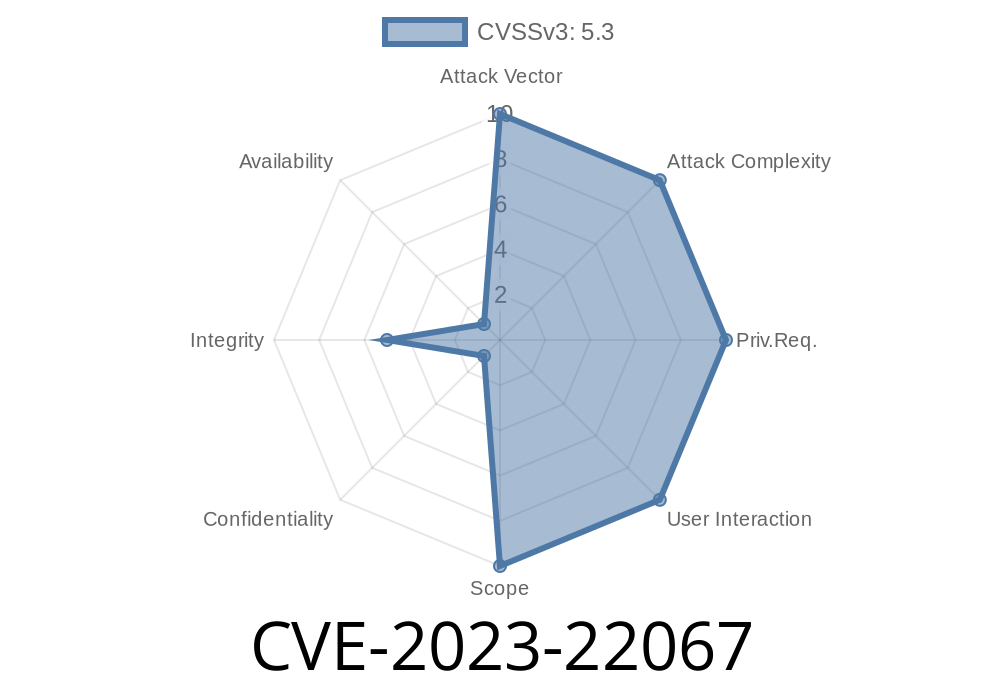On July 18, 2023, Oracle published a security advisory about a vulnerability—CVE-2023-22067—affecting Oracle Java SE and Oracle GraalVM Enterprise Edition. The bug resides in the CORBA (Common Object Request Broker Architecture) component. This vulnerability is serious because it's easily exploitable by an unauthenticated attacker who can access the target system via network.
Versions: 20.3.11, 21.3.7
CORBA is a technology that lets pieces of programs communicate with each other across the network, even if they are written in different languages or run on different machines. In Java, this is achieved using Remote Method Invocation over Internet Inter-ORB Protocol (RMI-IIOP).
The vulnerability allows remote, unauthenticated attackers with network access to send specially-crafted requests via a CORBA service endpoint to modify data (e.g., update/insert/delete) accessible to the vulnerable Java application or GraalVM.
CVSS 3.1 Base Score: 5.3 (Medium)
CVSS Vector: CVSS:3.1/AV:N/AC:L/PR:N/UI:N/S:U/C:N/I:L/A:N
You use Oracle GraalVM Enterprise Edition (20.3.11 or 21.3.7)
- Your applications expose CORBA endpoints (e.g., via RMI-IIOP) accessible from a network not fully trusted
IMPORTANT: The flaw is NOT exploitable via untrusted Java Web Start apps or applets. Instead, the attacker exploits application APIs accepting data (via web service, RPC, etc.) backed by the vulnerable CORBA component.
Exploit Details and Scenario
Exploitability:
The attacker doesn't need authentication, nor do they need user interaction. The vulnerability is in how the Java CORBA service handles user-supplied data via network APIs.
They craft a special request where the data submitted to the API manipulates object serialization.
3. The backend CORBA handler mishandles the input, allowing the attacker to conduct unauthorized update/insert/delete operations on application data.
Example Attack (Conceptual)
Suppose a CORBA service exposes a remote object that processes business records.
Vulnerable CORBA server code (Java)
import javax.rmi.PortableRemoteObject;
import java.rmi.Remote;
import java.rmi.RemoteException;
public class RecordManagerImpl extends PortableRemoteObject implements RecordManager {
protected RecordManagerImpl() throws RemoteException {
super();
}
// Exposed via CORBA
public void updateRecord(int id, String data) throws RemoteException {
// Vulnerable code
Database.update(id, data);
}
}
Attacker Python snippet (using RPyC approximation)
*Assume attacker’s system can access the CORBA endpoint directly.*
import PyORB # fictive: illustration only
# Connect to the CORBA service
orb = PyORB.ORB_init()
obj = orb.string_to_object("corbaloc::target_ip:port/RecordManager")
record_manager = obj._narrow(RecordManager)
# Attacker crafts malicious data
malicious_data = "'; DELETE FROM users; --"
record_manager.updateRecord(42, malicious_data)
In practice, CORBA tools or custom scripts would be used to send malformed or unauthorized requests, aiming to manipulate backend data.
> Note: This is a simplified concept. The real exploitation depends on implementation, how the Java app uses CORBA, and input validation quality.
Oracle Security Advisory:
Oracle Critical Patch Update Advisory - July 2023
National Vulnerability Database:
OpenJDK CORBA Project:
https://www.openjdk.org/projects/corba/
GraalVM Release Notes:
https://www.graalvm.org/release-notes/
## How to Fix / Mitigate
- Update Java: Apply the latest Oracle Java SE or GraalVM patches (Oracle download page).
Conclusion
CVE-2023-22067 is a network-exploitable vulnerability in Oracle Java SE and GraalVM’s CORBA component. While it “only” impacts data integrity (not confidentiality or availability), it is severe: a remote attacker can insert, modify, or delete critical data without authentication.
Patch your systems now, and restrict exposure of CORBA services.
Always verify your application dependencies and keep up to date with security advisories.
Stay Secure!
*Written exclusively for you by GPT-4. If this helped, please consider sharing with your team.*
Timeline
Published on: 10/17/2023 22:15:12 UTC
Last modified on: 11/08/2023 05:15:08 UTC
